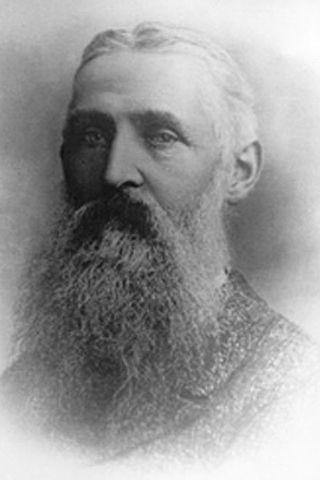Related Research Articles

Oamaru is the largest town in North Otago, in the South Island of New Zealand, it is the main town in the Waitaki District. It is 80 kilometres (50 mi) south of Timaru and 120 kilometres (75 mi) north of Dunedin on the Pacific coast; State Highway 1 and the railway Main South Line connect it to both cities. With a population of 14,350, Oamaru is the 28th largest urban area in New Zealand, and the third largest in Otago behind Dunedin and Queenstown. The town is the seat of Waitaki District, which includes the surrounding towns of Kurow, Weston, Palmerston, and Hampden, which combined have a total population of 23,200.

Sir William Jukes Steward was a New Zealand politician and the first Liberal Speaker of the New Zealand House of Representatives. He represented South Canterbury electorates in Parliament for a total of 34 years, before being appointed to the Legislative Council. He served briefly on the Otago Provincial Council and was Mayor of Oamaru for three years.

Oamaru Airport is an airport located 20 km north of Oamaru alongside State Highway 1, at Hilderthorpe in the North Otago region and the Waitaki District of New Zealand.

Dunedin North is a former New Zealand parliamentary electorate, which returned one Member of Parliament (MP) to the New Zealand House of Representatives. It was established for the 1905 election and has existed since. It was last held by David Clark of the New Zealand Labour Party, who replaced the long-standing representative Pete Hodgson. It was considered a safe Labour seat, with Labour holding the seat for all but one term (1975–1978) since 1928. In the 2020 electoral boundary review, Otago Peninsula was added to the area to address a population quota shortfall; with this change the electorate was succeeded by the Dunedin electorate in the 2020 election.

Waitaki is an electorate for the New Zealand House of Representatives that crosses the boundary of North Otago and South Canterbury towns on the East Coast of the South Island. The electorate was first established for the 1871 election that determined the 5th New Zealand Parliament. It has been abolished and re-established several times and in its early years was a two-member electorate for two parliamentary terms. The current electorate has existed since the 2008 election and is held by Miles Anderson of the National Party.
Chalmers, originally Port Chalmers, was a parliamentary electorate in the Otago Region of New Zealand, from 1866 to 1938 with a break from 1896 to 1902. It was named after the town of Port Chalmers, the main port of Dunedin and Otago.

William Ross Laney was a New Zealand Member of Parliament representing the Labour Party, and Mayor of Oamaru.
The Gold Fields District electorate was a 19th-century parliamentary electorate in the Otago region, New Zealand. It was created in 1862, with the first elections in the following year, and it returned two members. It was one of eventually three special interest constituencies created to meet the needs of gold miners. All three of these electorates were abolished in 1870. A unique feature of the Gold Fields District was that it was superimposed over other electorates, and voting was open to those who had held a mining license for some time. As such, suffrage was more relaxed than elsewhere in New Zealand, as voting was otherwise tied to property ownership. Another feature unique to the gold mining electorates was that no electoral rolls were prepared, but voting could be done upon showing a complying miner's license.
City of Dunedin, during the first two parliaments called Town of Dunedin, was a parliamentary electorate in Dunedin in Otago, New Zealand. It was one of the original electorates created in 1853 and existed, with two breaks, until 1905. The first break, from 1862 to 1866, was caused by an influx of people through the Otago gold rush, when many new electorates were formed in Otago. The second break occurred from 1881 to 1890. It was the only New Zealand electorate that was created as a single-member, two-member and three member electorate.
Oamaru was a parliamentary electorate in the Otago region of New Zealand, during three periods between 1866 and 1978.
The 4th New Zealand Parliament was a term of the Parliament of New Zealand.
Robert Campbell was a 19th-century New Zealand Member of Parliament representing Oamaru (Otago).
Charles Christie Graham was a 19th-century Member of Parliament in Otago, New Zealand.

Samuel Edward Shrimski was a 19th-century Member of Parliament and then a Member of the Legislative Council from Otago, New Zealand.
William Archibald Murray was a 19th-century Member of Parliament in Otago, New Zealand. During his time in parliament, he moved to the Waikato.
John Lillie Gillies was a 19th-century Member of Parliament from the Otago region of New Zealand. He was from Rothesay, Bute on the Isle of Bute, Scotland.
The Oamaru by-election 1885 was a by-election held in the Oamaru electorate during the 9th New Zealand Parliament, on 20 May 1885. The by-election was caused by the resignation of the incumbent, Samuel Shrimski, who was appointed to the Legislative Council, and was won by Thomas William Hislop.
Carl Zimmerman was a New Zealand sportsman. He played nine first-class cricket matches for Otago between the 1925–26 and 1929–30 seasons, represented the Canterbury Rugby Union and played competitive squash. He lived most of his adult life in Oamaru, working first as a teacher, then as a lawyer.
The 1879 City of Dunedin by-election was a by-election held on 15 July 1879 in the City of Dunedin electorate in Dunedin during the 6th New Zealand Parliament.
The 1880 Waitaki by-election was a by-election held on 16 June 1880 in the Waitaki electorate in the Otago and Canterbury regions during the 7th New Zealand Parliament.
References
- ↑ "The Election for Oamaru". North Otago Times. Vol. XII, no. 418. 28 May 1869. p. 2.
- ↑ "Hampden". North Otago Times. 28 May 1869.